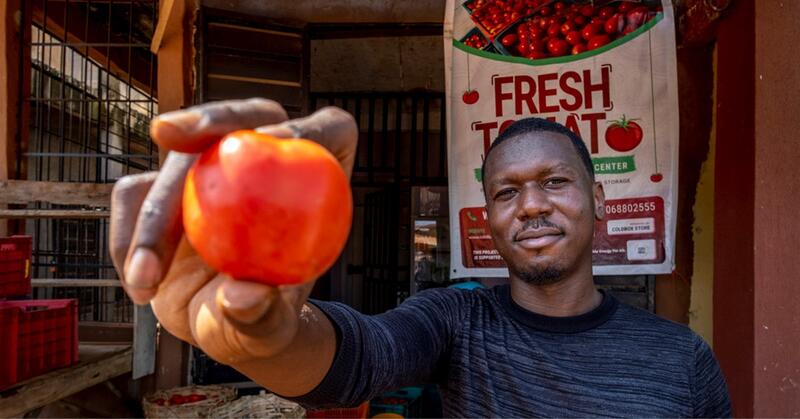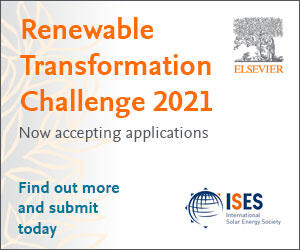Renewable Transformation Challenge
Renewable Energy Transformation Challenge 2021
Announcing the Renewable Transformation Challenge 2021 Winner
Elsevier and the International Solar Energy Society (ISES) are pleased to announce the winner of the Renewable Transformation Challenge 2021 - learn more below!
Coldbox Store wins RTC 2021!
London, November 30, 2021 – Elsevier, a global leader in research publishing and information analytics, and the International Solar Energy Society (ISES), are pleased to announce Coldbox Store as the winner of the 2021 Renewable Transformation Challenge (RTC).
Food waste is a significant driver in climate change, as 6% of all global greenhouse emissions come from the production of food that is never eaten1. This creates a vicious cycle of more extreme climate, which makes food production more difficult and exacerbates poverty, malnutrition and inequality across society.
This year’s winner, Coldbox Store offers one solution that can help address this problem. By connecting perishable food farmers to markets and handle the cold chain logistics to ensure fresh produce is received at the expected quality, because 50% of the fruits and vegetables produced in Nigeria are never consumed due to post-harvest losses, and suffer from poor storage conditions, reducing what farmers can charge for their products.
“Coldbox Store is a walk-in, commercial, refrigeration solution that can store up to 15 tons of fruits and vegetables at a time,” said this year’s winner Uzochukwu Mbamalu on behalf of the Coldbox Store Team. “This can increase the shelf life of fresh produce, such as tomatoes, from 2 days to 21 days. It is an efficient refrigeration system that uses solar power for precooling and cold storage. The system is designed to be completely off-grid as Solar PV powers the entire solution.
“We have what it takes to bring about change - all we have to do is take action,” Mr. Mbamalu added.
Launched in 2017, the RTC aims to honor and showcase outstanding work that actively supports the transformation to a world powered by renewable energy and showcasing the potential to widen access to energy—particularly in low- and middle-income countries. The Challenge is open to individuals and organizations in both not-for-profit and commercial sectors worldwide. Over 85 entries were received this year, and were scored in terms of applicability, impact, sustainability and scalability in two stages: first by the Juror Panel; and then by the Elsevier-ISES Awards Committee who selected the final winner from the ten shortlisted candidates.
Klaus Vajen, President of ISES, said “Since the launch of the RTC in 2017, we have seen hundreds of applications from around the world, the best of which reflect incredible work being done by organizations, businesses and research institutions to address some of the most pressing challenges of our time. The RTC aims to highlight the many programs that help move the world toward an energy system supplied entirely by renewable energy sources and provide access to reliable renewable energy.
“As President of ISES and a member of the jury, I was impressed by the level of commitment and innovation of this year’s applications—it is inspiring to see real-world projects that utilize solar energy as the most reliable and affordable energy source. We are very pleased to be awarding the prize to the Coldbox Store team, whose project offers an innovative and replicable solution to address food waste through solar energy technologies. Engr. Mbamalu and his team have implemented a project that improves lives while addressing climate change.”
Peter Harrison, Senior Vice President, Physical Sciences Journals at Elsevier said “Coldbox Store demonstrates powerfully how addressing climate change through renewable energy transformations can lead to positive changes in so many other ways: lifting people out of poverty; reducing waste; and feeding those in need. Elsevier is proud to award Uzochukwu Mbamalu’s team for their work, which was the standout entry among many strong applications. We’d like to thank our partners at the International Solar Energy Society and the judges and jury for their thoughtful consideration.”
Watch a recording of this year’s awards ceremony here.

About the Challenge
The objective of the Elsevier-ISES Renewable Transformation Challenge Promotion (“Challenge”) is to recognize and honor outstanding work encouraging progress towards a world powered by renewable energy and with accessible energy for all. This objective is consistent with the vision of the International Solar Energy Society (ISES), which is for a world powered by 100% renewable energy used efficiently and wisely and accessible for all.
The Challenge promotion is administered every two (2) years to recognize accomplishments by organizations such as private enterprises, NGO’s, and research institutions for undertaking projects and programs that help move the world toward an energy system supplied entirely by renewable energy sources, or for conducting the critical analyses that provide meaningful roadmaps for the transformation. The award winner represents one step towards furthering ISES’ vision of a world powered by 100% renewable energy. This vision requires a global transformation of our energy systems to efficient and affordable renewable energy sources. This transformation can only be achieved through private and civil society initiatives towards innovative and successful programs that adopt the use of renewable energy technologies and the intelligent application of energy efficiency measures. In the context of this Challenge, the energy transformation applies to all end-use energy consumption: power, heat, and transport.
Applications for the Challenge are invited from organizations who can demonstrate that they have established successful projects, innovative technologies, financing schemes, policy initiatives, or renewable energy programs, or from institutions that have undertaken research and analyses and identified solutions that demonstrate how this goal is being met. The Challenge can include either supply side (energy generation for end-use energy consumption) or demand side (including energy efficiency) programs, or both, and applicants may address any or all of the end-use energy sectors mentioned above.
For the 2021 prize, the Judges and Jury are particularly interested in applications which demonstrate applicability, impact, sustainability and scalability in how they support a green recovery from COVID-19 at local, regional or global scales. However, applications that do not directly address this topic will still be considered
Innovative ideas will be given preference over incremental improvement projects.
The Challenge is not a funding body and applications still in conceptual stage with little supporting evidence of viability are unlikely to proceed past the first evaluation phase.
Details of how the application supports the renewable energy transformation must be very clear.
The winning proposal will be the one that best demonstrates the potential to widen access to energy, particularly in developing countries, through a transformative application of renewable energy technologies, taking into consideration societal impacts, project replicability, environmental improvement, economic viability, and energy access.

Learn More: Past Winners and RTC Podcasts
Meet the 2019 Renewable Transformation Challenge winners - Team SUNSPOT here. Team SUNSPOT works to replace polluting fuels with a solar-powered home cooking system.
In 2017, the team at ME SOLshare won the first ever Renewable Transformation Challenge with their project "The Energiewende 3.0 - Smart P2P Solar Grids". ME SOLshare provides a peer-to-peer solar energy trading platform empowering individuals and SMEs to become solar entrepreneurs offering pay-as-you-go and cash-in-as-you-go electricity solutions to low-income households. ME SOLshare therefore has potential to play a crucial role in supporting rural development and providing a means of direct income to rural communities.
To learn even more about the challenge, have a listen to our podcasts about the Renewable Transformation Challenge:
- About the Challenge background, prize and judging panel with Joanna Costello and Fernanda Ogochi
- Learn about the judging criteria with Yogi Goswami and Joanna Costello
- Learn why this challenge is so important and what the judges are looking for from the winning entry with Dr David Renné and Joanna Costello
- About why we launched the Challenge, and what we learned from the 2017 award with Dr David Renné and Adam Fraser